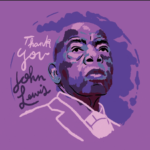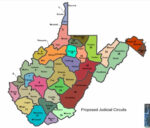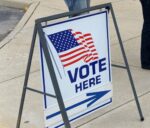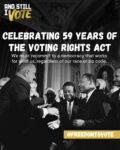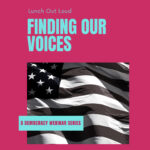- Like
- Digg
- Del
- Tumblr
- VKontakte
- Buffer
- Love This
- Odnoklassniki
- Meneame
- Blogger
- Amazon
- Yahoo Mail
- Gmail
- AOL
- Newsvine
- HackerNews
- Evernote
- MySpace
- Mail.ru
- Viadeo
- Line
- Comments
- Yummly
- SMS
- Viber
- Telegram
- Subscribe
- Skype
- Facebook Messenger
- Kakao
- LiveJournal
- Yammer
- Edgar
- Fintel
- Mix
- Instapaper
- Copy Link
by Pam Nixon and Vivian Stockman
Two things happened recently that highlight the importance of the way we choose our judges. The NAACP filed lawsuits in Louisiana, Alabama, and Arkansas that argue that their judicial election districts are discriminatory. Separately, the Brennan Center for Justice looked at states across the country and found that our state supreme courts are woefully unrepresentative of the populations our courts serve. Both tell us that the way we choose our judges has a big impact on representation on the bench and, ultimately, on our aspirations for racial justice in our criminal legal system.
The NAACP lawsuits in Louisiana, Alabama, and Arkansas are different in their specifics, but fundamentally, they all make the same argument — that the districts used to elect their judges result in a disproportionate amount of white judges compared to the voting preferences of African Americans in the state. The Louisiana argument suggests that their judicial districts are racially gerrymandered. In Alabama and Arkansas, however, they argue that the black population of those states is disadvantaged by the at-large elections — in essence, that the districts are gerrymandered by being one big district (and thereby diluting the voting power of large African American populations in those states) instead of allowing for some majority-black districts to elect judges of their own preference.
West Virginia also uses at-large elections for our five supreme court seats. According to the 2018 United States Census, West Virginia’s population is 93 percent white, four percent African American and three percent other, but our 5-member supreme court is all-white. According to the Brennan Center for Justice’s new report documenting representation on state supreme courts, we are one of the 24 U.S. states with an all-white state supreme court. According to the Prison Policy Initiative, African Americans are over-represented in the West Virginia prison and jail system at 28 percent, with other at 7 percent and Whites under-represented at 65 percent.
Of course, West Virginia’s black population is not the same as in Louisiana, Arkansas, or Alabama, where it is large and geographically concentrated enough to make up a majority voting block in one or more districts in the state. Gerrymandering (in the courts) isn’t our problem. Further complicating the situation, the Brennan Center’s report suggests that elections have rarely led to greater diversity on state courts, and appointment systems have traditionally been much better. But that doesn’t mean there is nothing we can do to bring greater representation to our judiciary at every level.
West Virginia stands out as one of the few states that provides state supreme court candidates with public financing. This came about in the wake of a U.S. Supreme Court ruling regarding former Massey Energy CEO Don Blankenship spending $3 million in support of WV Justice Brent Benjamin’s candidacy. Blankenships’ support meant Benjamin could be considered biased in how he ruled in the case of Caperton v. Massey.
The aim of public financing was to remove conflicts of interest from our courts by giving judicial candidates the ability to run for office without taking money from parties who may later have cases before the court. This program may also offer us a way forward to more representative courts. If it is strengthened and expanded, it could help a more diverse set of qualified judges get over the hurdles between them and the bench.
North Carolina, which also elects its judges, is one of the exceptional states in terms of both gender and racial diversity on their bench. That may be because it had a model judicial public financing system for its judges for years until it was unfortunately cut by their racially gerrymandered state legislature. Their new supreme court Chief Justice, Cheri Beasley, first came to the bench with the public financing program, which existed for lower-level judges as well — providing a pipeline of qualified and diverse judges for higher offices. It’s been shown that women and people of color have a much harder time fundraising for campaigns for office, and a public financing program can help eliminate this barrier to office for these candidates.
Unfortunately, just as in North Carolina, West Virginia’s reforms to protect judicial independence and promote a fair judiciary have come under serious threat from well-funded corporate interests channeling millions into key elections. A 2017 report from the Brennan Center for Justice and the National Institute on Money in State Politics noted that in 2016 five candidates ran for one seat on the WV Supreme Court, attracting more than $3 million in political advertising from outside sources. This out-of-control spending has challenged the viability of the current judicial public financing program.
In addition, a spending scandal at the court eroded public trust and confidence in the judiciary to an all-time low.
While the court adopted some new accountability standards focused on addressing the practices that got them in trouble last year, much remains to be done to improve the integrity of and restore confidence in the court. For many West Virginians, being able to see someone on the bench who comes from a similar background and life experience is also an important part of having trust in decisions from the court. Fortunately, the WV Citizens for Clean Elections coalition has a roadmap to implementing the types of reform we need. It’s the Anti-Corruption, Pro-Democracy Platform, an initiative fighting for fairer, more diverse courts in West Virginia, as well as numerous other important reforms to our state’s politics.
We know that protecting and improving public financing won’t transform our courts overnight. In order for our courts to be more fair and just, there has to be a concerted effort, starting even before law school, to recruit a diverse pool of talented law students who could eventually become judges.
We also know that you shouldn’t have to be wealthy, white, and male to run for state supreme court, and that West Virginians who end up before our judges should be able to trust that there are a range of life experiences represented.
Pam Nixon is a board member with OVEC-the Ohio Valley Environmental Coalition and the People Concerned About Chemical Safety. Vivian Stockman is the executive director of OVEC. A version of this commentary was published Aug. 18, 2019 in the Charleston Gazette-Mail.



